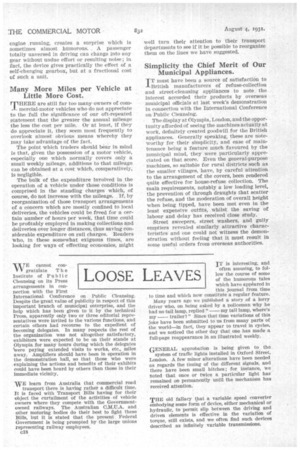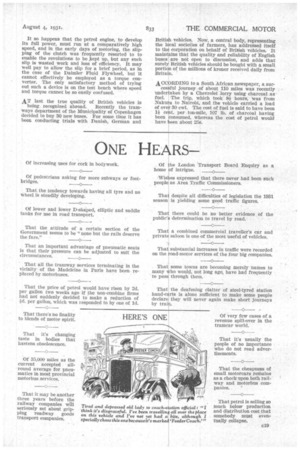LOOSE LEAVES
Page 40

Page 41

If you've noticed an error in this article please click here to report it so we can fix it.
WE cannot congratulate T h e Institute of Public Cleansing on its Press arrangements in connection with the First International Conference on Public Cleansing. Despite the great value of publicity in respect of this important branch of municipal enterprise, and the help which has been given to it by the technical Press, apparently only two or three editorial representatives were invited to the various functions, and certain others had recourse to the expedient of becoming delegates. In many respects the rest of the organization was not altogether satisfactory, exhibitors were expected to be on their stands at Olympia for many hours during which the delegates were paying extended visits to works, etc., miles away. Amplifiers should have been in operation in the demonstration hall, so that those who were explaining the actions and benefits of their exhibits could have been heard by others than those in their immediate vicinity.
WE learn from Australia that commercial road transport there is having rather a difficult time. It is faced with Transport Bills having for their object the curtailment of the activities of vehicle owners where they compete with the Governmentowned railways. The Australian C.M.T.T.A. and other motoring bodies do their best to fight these Bills, but it is stated that the present Federal Government is being prompted by the large unions representing railway employees.
c18 IT is interesting, and often amusing, to follow the course of some of the humorous tales which have app4ared in this journal from time to time and which now constitute a regular feature.
Many years ago we published a story of a lorry driver who, on being asked by a policeman why he had no tail lamp, replied " — my tail lamp, where's my — trailer?" Since that time variations of this joke have been submitted to us from many parts of the world—in fact, they appear to travel in cycles, and we noticed the other day that one has made a full-page reappearance in an illustrated weekly.
GENERAL approbation is being given to the system of traffic lights installed in Oxford Street, London. A few minor alterations have been needed as regards the timing of the different signals, and there have been small hitches; for instance, we noted that once or twice a particular light has remained on permanently until the mechanism has received attention.
TIIE old fallacy that a variable speed converter embodying some form of device, either mechanical or hydraulic, to permit slip between the driving and driven elements is effective in the variation of torque, still exists, and we often find such devices described as infinitely variable transmissions. It so happens that the petrol engine, to develop its fall power, must run at a comparatively high speed, and in the early days of motoring, the slipping of the clutch was frequently resorted to to enable the revolutions to be kept up, but any such slip is wasted work and loss of efficiency. It may well pay to allow the slip for a brief period, as in the case of the Daimler Fluid Flywheel, but it cannot effectively be employed as a torque converter. The only satisfactory method of trying out such a device is on the test bench where speed and torque cannot be so -easily confused.
AT last the true quality of British vehicles is being recognized abroad. Recently the tramways department of the Municipality of Copenhagen decided to buy 30 new buses. For some time it has been conducting trials with Danish, German and British vehicles. Now, a central body, representing the local societies of farmers, has addressed itself to the corporation on behalf of British vehicles. It maintains that the quality and reliability of English buses are not open to discussion, and adds that surely British vehicles should be bought with a small portion of the millions of kroner received daily from Britain.
ACCORDING to a South African newspaper, a suc cessful journey of about 110 miles was recently undertaken by a Chevrolet lorry using charcoal as fuel. The trip, which took 8-3: hours, was from Nakura to Nairobi, and the vehicle carried a load of over 30 cwt. The cost of fuel is said to have been li cent. per ton-mile, 107 lb. of charcOal having been consumed, whereas the cost of petrol would have been about 25s.












































































































